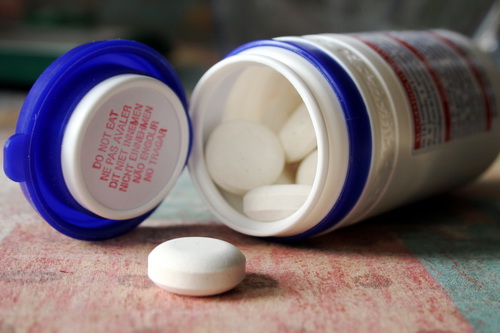
What is vitamin E?
Vitamins are essential nutrients which are required by our body, in small amounts, for proper functioning. A well balanced diet ensures the vitamin requirements of our body. Vitamin E is a fat-soluble vitamin which is present in various foods. In the human body, vitamin E acts as an anti-oxidant and helps in protecting cells from damage caused by the free radicals present in our body. Vitamin E is required by our body for boosting our immune system. Good sources of vitamin E include vegetable oils, eggs, fruits, meat, and wheat germ oil. People also take various vitamin E supplements to meet their body requirements.
- Important notification about information and brand names used in this slideshow!
- Photo courtesy of Gastonmag by sxc : www.sxc.hu/photo/534531
- www.webmd.com/vitamins-and-supplements/lifestyle-guide-11/supplement-guide-vitamin-e
- http://health.howstuffworks.com/wellness/food-nutrition/vitamin-supplements/benefits-of-vitamin-e.htm
- http://www.drweil.com/drw/u/ART02813/facts-about-vitamin-e
- http://ods.od.nih.gov/factsheets/VitaminE-QuickFacts/
- http://ods.od.nih.gov/factsheets/VitaminE-HealthProfessional/
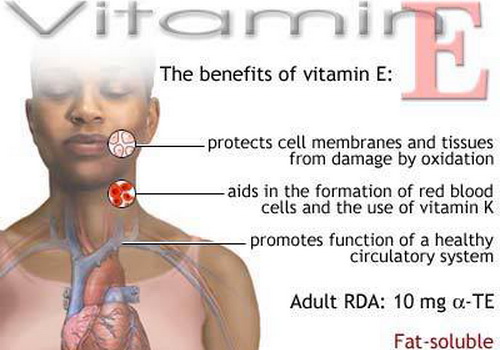
Why is vitamin E necessary?
Vitamin E is required by our body as it helps in boosting our immunity. It is vital for maintaining healthy skeletal, cardiac, and smooth muscles. It contributes towards the formation of red blood cells. Vitamin E also plays an important role in maintaining stores of vitamins A, K, selenium, and iron. It protects our body against the oxidative damage that might lead to heart diseases. Other benefits of Vitamin E include its role in easing the symptoms of Alzheimer’s disease. Vitamin E contributes in preventing diabetes inflicted damage on our body, specifically our eyes. Vitamin E is also known to widen blood vessels and prevents blood from clotting inside them.
- Important notification about information and brand names used in this slideshow!
- Photo courtesy of skribble08 by Photobucket : media.photobucket.com/user/skribble08/media/ui2u/d-vitamin-e.jpg.html?filters[term]=vitamin%20e&filters[primary]=images&filters[secondary]=videos&sort=1&o=6
- www.drweil.com/drw/u/ART02813/facts-about-vitamin-e
- http://health.nytimes.com/health/guides/nutrition/vitamin-e/overview.html
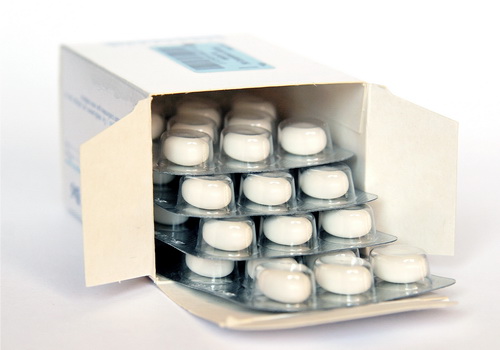
How much vitamin E should you take?
The average requirement of vitamin E depends upon an individual’s age. Children between 0-12 months of age require about 4-5 mg of Vitamin E per day. Children ranging between 1 to 8 years of age require about 6-7 mg of Vitamin E on a daily basis. The vitamin E requirement for children between 9-13 years of age is 11 mg per day. Teenagers and adults require about 15 mg of vitamin E on a daily basis. Breastfeeding teens and women need 19 mg of vitamin E per day. Your diet should be well balanced so that it meets your daily vitamin E requirement. Any excess vitamin E in your body is stored for future use so it is not mandatory for you to include it in your diet on a daily basis.
- Important notification about information and brand names used in this slideshow!
- Photo courtesy of Gastonmag by sxc : www.sxc.hu/photo/781607
- ods.od.nih.gov/factsheets/VitaminE-QuickFacts/
- http://www.nhs.uk/Conditions/vitamins-minerals/Pages/Vitamin-E.aspx

Deficiency signs and symptoms
Deficiency of vitamin E is very rare phenomenon. Vitamin E deficiency mostly inflicts people who cannot absorb the fat in their diets or those who have a rare disorder of fat metabolism. This is primarily because our digestive tract requires fat for the absorption of vitamin E. Babies who are born premature and have extremely low weight (less than 1500 grams) might be vitamin E deficient. The signs and symptoms of vitamin E deficiency include peripheral neuropathy, retinopathy, skeletal myopathy, and an impaired immunity. Chronic diarrhea, inability to secrete bile, and greasy stools are also signs of vitamin E deficiency.
- Important notification about information and brand names used in this slideshow!
- Photo courtesy of Elnaz6 by Wikimedia Commons : commons.wikimedia.org/wiki/File:Baby_on_Back.jpg
- ods.od.nih.gov/factsheets/VitaminE-HealthProfessional/#h6
- http://www.drweil.com/drw/u/ART02813/facts-about-vitamin-e
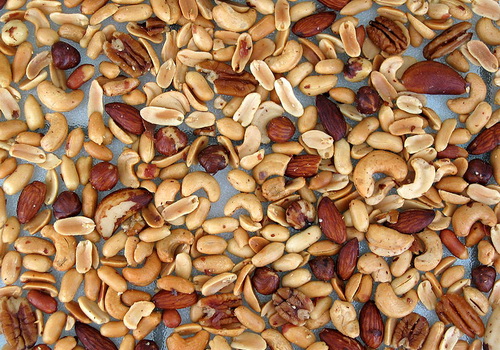
Sources of vitamin E
Foods that are naturally rich in Vitamin E are listed below: • Nuts such as peanuts, almonds, and hazelnuts and seeds like sunflower seeds are rich sources of vitamin E. • Vegetables oils such as sunflower, wheat germ, safflower oil, corn oil and soybean oil are excellent sources of vitamin E. • Green vegetables such as broccoli and spinach are also good sources of vitamin E. • Other sources of vitamin E include fortified cereals, eggs, avocadoes, and whole grains. Vitamin E supplements are also available in the market. You must look for ‘d-alpha-tocopherol’ on supplement labels. It implies that the vitamin E in the supplement has been derived from natural or food sources.
- Important notification about information and brand names used in this slideshow!
- Photo courtesy of Melchoir by Wikimedia Commons : en.wikipedia.org/wiki/File:Mixed_nuts_spread.jpg
- ods.od.nih.gov/factsheets/VitaminE-QuickFacts/
- http://ods.od.nih.gov/factsheets/VitaminE-HealthProfessional/#h6

Vitamin E and cancer
Although vitamin E is known to protect cell health due to its antioxidant properties, it is important to note that research has shown that vitamin E does not help in preventing cancer. It might even be harmful in certain cases. Studies have shown that large doses of vitamin E have not been able to prevent colon and breast cancer. Another study has shown that taking vitamin E supplements for several years increases the risk of developing prostate cancer. However, another study has found that vitamin E supplements when taken for more than 10 years might lower the risk of death from bladder cancer. Vitamin E supplements might even interfere with radiation and chemotherapies.
- Important notification about information and brand names used in this slideshow!
- Photo courtesy of dutch1962 by sxc : www.sxc.hu/photo/345735
- ods.od.nih.gov/factsheets/VitaminE-QuickFacts/
- http://www.webmd.com/vitamins-supplements/ingredientmono-954-VITAMIN+E.aspx?activeIngredientId=954&activeIngredientName=VITAMIN+E&source=2&tabno=2
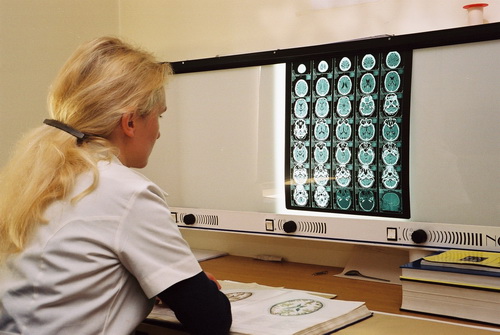
Effect of Vitamin E on Heart and Mental Function
There are mixed results of studies trying to find the effect of taking vitamin E on heart. Certain studies have pointed out that taking higher intakes of vitamin E might lower the risk of cardiovascular diseases. Vitamin E is known for its antioxidant properties and inhibits the oxidation of bad cholesterol. It also prevents blood clots which can lead to a heart attack. However, certain other studies point out that taking vitamin E supplements does not prevent heart disease or reduce its severity. Intake of vitamin E supplements by patients suffering from Alzheimer’s disease might provide some protection from further loss of memory. However, taking vitamin E supplements does not slow down the progression from mild memory problems to a full blown form of Alzheimer’s disease.
- Important notification about information and brand names used in this slideshow!
- Photo courtesy of tkobosz by sxc : www.sxc.hu/photo/262491
- www.webmd.com/vitamins-supplements/ingredientmono-954-VITAMIN+E.aspx?activeIngredientId=954&activeIngredientName=VITAMIN+E&source=2&tabno=2
- http://ods.od.nih.gov/factsheets/VitaminE-HealthProfessional/#h6
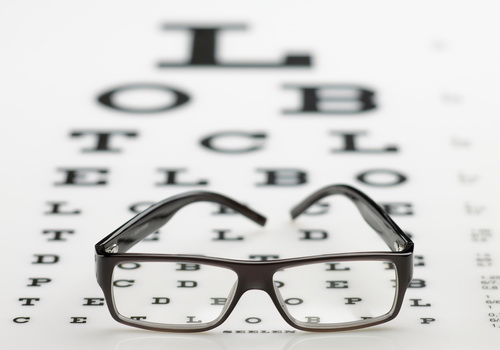
Vitamin E and eye health
Some of the most common causes of vision loss in older people include age-related macular degeneration (AMD) and cataract. There is little evidence as of now which might prove whether taking vitamin E supplements can reduce the overall risk of developing cataracts and AMD. Regular intake of vitamin E and other anti-oxidants, can, however, slow down the onset of these conditions in people who are in the early stages of these diseases. Studies have found that regular intake of vitamin E supplements can lower the risk of developing advanced stages of AMD by about 25%. Regular intake of vitamin E is advised for maintaining an overall good eye health.
- Important notification about information and brand names used in this slideshow!
- Photo courtesy of Brybs by sxc : www.sxc.hu/photo/1152189
- ods.od.nih.gov/factsheets/VitaminE-HealthProfessional/#h6
- http://www.aoa.org/patients-and-public/caring-for-your-vision/diet-and-nutrition/vitamin-e

Interaction of vitamin E with Other Medications
Vitamin E might interact with certain medications. Some specific instances of interaction of vitamin E dietary supplements with other medications are listed below: • People who take anticoagulant or anti-platelet medications are at a high risk of bleeding while taking vitamin E supplements. • Vitamin E supplements might interact with medications given to people undergoing chemotherapy. Vitamin E might reduce the effectiveness of certain medications for cancer. • Vitamin E might also interfere with medications used for lowering cholesterol. Taking vitamin E in combination with beta-carotene, vitamin C, and selenium is known to lower the effectiveness of statins. • Vitamin E also interferes with niacin which increases good cholesterol. Vitamin E when taken in combination with beta-carotene, vitamin C, and selenium is known to lower the effectiveness of niacin.
- Important notification about information and brand names used in this slideshow!
- Photo courtesy of forwardcom by sxc : www.sxc.hu/photo/915933
- www.webmd.com/vitamins-supplements/ingredientmono-954-VITAMIN+E.aspx?activeIngredientId=954&activeIngredientName=VITAMIN+E&source=2&tabno=2
- http://ods.od.nih.gov/factsheets/VitaminE-QuickFacts/

Risks and side effects of taking vitamin E
When taken for short periods of time and within the recommended tolerable upper limits, vitamin E is considered to be safe. However, intake of vitamin E for longer periods of time and exceeding the tolerable upper limits might pose certain risks. Over consumption of Vitamin E supplements might cause dizziness, headache, fatigue, blurred vision, nausea, abdominal pain, and diarrhea. It might also increase the risk of hemorrhagic stroke and heart failure. Prolonged intake of high doses of vitamin E might also cause prostate cancer. Vitamin E supplements might be harmful for the fetus when taken in the early stage of pregnancy. People undergoing angioplasty should not take vitamin E supplements immediately before and after angioplasty.
- Important notification about information and brand names used in this slideshow!
- Photo courtesy of moneyatworkphilippines by Photobucket : media.photobucket.com/user/moneyatworkphilippines/media/vitamins.jpg.html?filters[term]=vitamins&filters[primary]=images&filters[secondary]=videos&sort=1&o=22
- www.webmd.com/vitamins-supplements/ingredientmono-954-VITAMIN+E.aspx?activeIngredientId=954&activeIngredientName=VITAMIN+E&source=2&tabno=2
- http://www.mayoclinic.com/health/vitamin-e/NS_patient-vitamine/DSECTION=safety







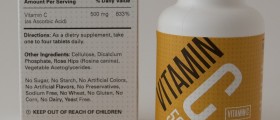














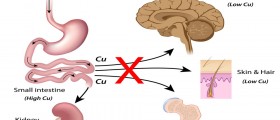
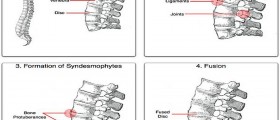



Your thoughts on this
Loading...